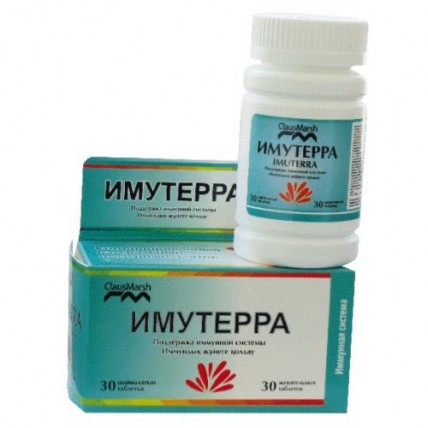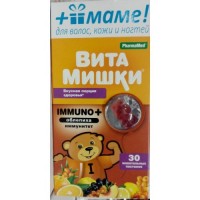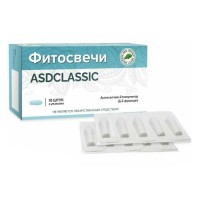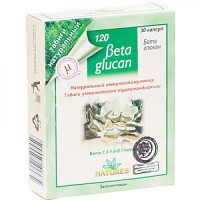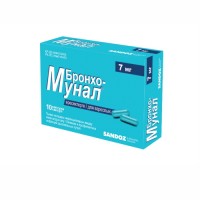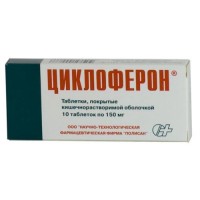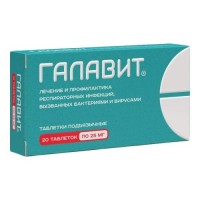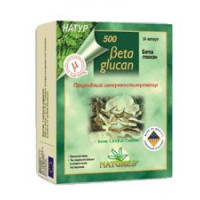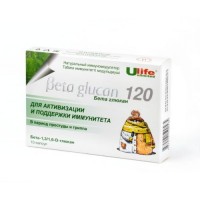IMUTERRA Ingredients chewable tablets: Beta-1.3-glyukan - 100 mg, Arabinogalaktana of a root (powder) - 227 mg, Grib to a maytaka - 17 mg (the maintenance of D-fraction - 5 mg), Stevias leaves - 17 mg, a root Milk vetch (powder) – 50 mg, Dimetilglitsin - 200 mg, Vitamin C - 250 mg, Vitamin E - 100 ME, Zinc oxide of 5 mg. Pharmacological properties: Imuterra is a complex drug, an immunomodulator, contains mix of clinically checked ingredients allowing to strengthen various levels of the immune system. The arabinogalactan received from the larch growing in the Western countries represents polysaccharide with a high molecular weight. Arabinogalactan is the natural immunomodulator activating reticuloendothelial system (RES), first of all phagocytosis. Arabinogalactan increases almost twice efficiency of formation of macrophages in comparison with other vegetable immunostimulators. It is established that arabinogalactan stimulates phagocytal activity of macrophages concerning pseudotuberculous bacteria, having the significant overwhelming effect on reproduction them in macrophages. It affects all links of phagocytal process, activating a chemotaxis, adhesion, absorbing and bactericidal capacity of macrophages. Besides, it activates other branch of the immune system of the person – the system of a complement. Arabinogalactan also has properties of prebiotic. Thanks to it, being food for bifidobacteria and lactobacilli, selectively stimulates growth and activity of normal intestinal microflora that also strengthens the immune system of an organism due to detoksikatsionny function. A beta glucan the nonspecific activator of macrophages, most widespread in the nature, allocated from cell walls of hlebopekarsky Saccharomyces cerevisiae yeast. When binding beta-1.3 - glucan with receptors the macrophages pass into an active state that provides fast capture of microorganisms, their toxins, products of active forms of oxygen for protection against pathogenic microbes. Besides, thanks to beta-1.3-to glucan, macrophages begin to allocate molecules of cytokines - biologically active agents activating molecular processes of immunity (interleukin-1, interferon - gamma, tumor necrosis factor). Cytokines activate the specific and nonspecific cellular immune response (T-killers and natural killers) defining protection against viruses and malignant cells. Beta-1.3 - glucan is taken M-cells mucous intestines and are actively transferred to a submucosal layer where macrophages, and through them activate the lymphocytes responsible for protection mucous, i.e. for local immunity. Thanks to the repopulyation mechanism, activated lymphocytes from mucous intestines are settled also in mucous airways, and an urinogenital path, providing, thus protection against infections and cancer of all mucous an organism. A part of these beta glucans with a blood flow through a portal vein get into a liver. 30% of mass of a liver are Kupferovsky cells which emit the cytokines (IL-1, 12, etc.) activating system immunity. Thus, beta glucan powerfully activate also local immunity, providing protection of an organism against invasions of alien genetic material, and protection of all body against already got infection or cellular treason in the form of cancer (system immunity). Reliable laboratory and clinical data confirm the activating action beta 1.3 - glucan on skin macrophages who englobe pathogenic microbes and dead cells and also allocate a growth factor of the epidermal cells stimulating formation of collagen and elastin and an angiogenesis factor. Astragalus membranaceus - one of the main herbs having immunomodulatory properties. Several useful components which protect an organism are a part of a milk vetch. These are triterpenovy saponins (astragalozid), flavonoids, phytosterols (beta sitosterol), sincaline, a betaine. The fraction of polysaccharides of a milk vetch found immunopromoting effect. Researches showed that the root of a milk vetch increases production of interferon - an important component of the immune system. Also the milk vetch stimulates macrophages, formation of immunoglobulin also activates T-cells. Thanks to saponins the root of a milk vetch increases functions of a spleen. Thus, according to results of modern researches, the root of a milk vetch possesses the following actions: increases nonspecific humoral and cell-mediated immunity, increases activity of natural killers, stimulates formation of interferon and leukocytic immune factors. Its immunopromoting effect is comparable to effect of immunoglobulins. Besides, the milk vetch interferes with decrease in immunity at chemotherapy. Unlike other immunostimulators, the root of a milk vetch has such important property as, increase in quantity of stem cells in marrow and lymphatic fabrics. The mushroom to a maytaka (a grifola curly) has immunomodulatory effect. Medical action of a grifola curly is caused by the high content of polysaccharides (D-fraction and grifolan). The mushroom research showed to a maytaka at oncological patients reliable stimulation of immune cells, such as cell NK (natural killers) who have cytotoxicity concerning the cells infected with viruses, inhibit growth and interfere with regeneration of many cells. The mushroom to a maytaka has immunomodulatory property, activates macrophages, stimulates activity of T lymphocytes, strengthens interferon synthesis that provides suppression of growth and development of different types of viruses. Thanks to antineoplastic activity of d-fraction the mushroom to a maytaka prevents transition of benign education to malignant, also authentically reduces metastasis speed. Stevias leaves consist of diterpenic glycosides, 17 amino acids (a lysine, methionine, glycine and dr), carotinoids, B1, B2, C, E, D vitamins, polyunsaturated fatty acids, flavonoids (Rutinum, meletin, etc.), alkaloids, saponins, essential oils, tannins, pectins, oligosaccharides and also necessary for a human body macro - and microelements (iron, phosphorus, potassium, magnesium, calcium, manganese, silicon, zinc, copper, selenium and others is lame). The diterpenic glycosides which are contained in leaves of a stevia possess bactericidal and fungotsidny actions, especially concerning Candide, substantially improve a functional condition of the immune system, normalize work of closed glands and also increase toxins resistance of an organism. Amino acid a lysine gives to a stevia antiviral properties and also plays an important role in production of hormones and antibodies. Bactericidal action of a stevia amplifies at the expense of hydroxy-cinnamic acid, and thanks to oligosaccharides, this plant shows prebiotic action, promotes recovery of balance of useful intestinal microflora that also provides the affirmative immune response of an organism. The conducted researches proved immunomodulatory and antineoplastic action of a stevia at patients with diseases of a prostate and mammary gland. The stevia has hypoglycemic effect, promoting decrease in level of glucose in blood. And it in turn, strengthens work of the immune system. Dimetilglitsin as a source of methyl groups, except restoration of cellular DNA, performs detoksikatsionny function, leucopoiesis activates and influences the first link of immunity that increases resistance of cells of an organism to influence of viruses. The main function of vitamin C are a strengthening of the immune system. It provides protection to leukocytes which spend a vitamin C reserve at fight with diseases. Also vitamin C strengthens production of antiviral interferon organism cells that works on all causative agents of diseases — parasites, viruses, microbes. Vitamin C shows immunopromoting effect also thanks to stimulation of growth of lymphocytes. Especially immunopromoting effect of vitamin C is shown in combination with bioflavonoids, vitamin E and zinc. This combination will effectively mobilize the immune system of an organism therefore it is applied to prevention of acute and persistent viral and bacterial infections. Vitamin C raises the nonspecific immune response, increases phagocytal activity of macrophages of cells, besides, development of antibodies and speed of maturing of immune cells also increases. Important function of vitamin C is an antioxidant property thanks to which natural protection of an organism against influence of the free radicals breaking oxygen exchange is provided. It protects humoral and cellular components from oxidation and loss of functions under the influence of free radicals. Vitamin E possesses immunopromoting effect - stimulates cell-mediated and antibody-mediated immunity, increases activity of T lymphocytes. Besides, protection of cells against action of peroxide connections and free radicals is carried out by vitamin E due to ability of a molecule of alpha tocopherol of acetate to be built in a cellular membrane, thus interfering with contact of oxygen and free radicals with nonsaturated lipids of cellular membranes. Zinc is the strongest immunostimulator. Zinc participates practically in all links of a system of immunity: in the course of maturing of lymphocytes and reactions of cell-mediated immunity, increases the level of thymine and Timosinum, developed by the central body of immunity - a thymus gland, increases protective antimicrobial activity of neutrophils and macrophages, increases development of protective antibodys. Low level of zinc leads to weakening of the immune system of the person. Indications: Complex treatment at the weakened immunity: Frequent catarrhal diseases, flu, pneumonia, acute and chronic bronchitis, an adenoid disease, sinusitis, tuberculosis, oncological diseases, Various viral diseases, including viral diseases of genitals: sexual herpes, a cytomegalovirus, a papillomavirus, condylomas, Clamidiosis, mycoplasmosis, ureaplasmosis, Pustulous diseases of skin, Benign formation of a prostate (prostate adenoma) and a mammary gland, Long intake of immunosuppressive medicines, In complex treatment of various allergies, liver diseases (viral hepatitis, initial stages of cirrhosis, fat dystrophy, hepatoses), In complex treatment of helminthoses, a giardiasis, the Contraindication: individual intolerance of separate components of drug. Side effects: Are not revealed. Use doses: to children 5 years and the adult on 2 chewable tablets 1-2 times a day are more senior. Packaging: chewable tablets No. 30. Producer: CJ labs Inc., Miami, USA. The owner of a trademark and the certificate of registration is the Claus Marsh company, Great Britain. The organization accepting claims in RK: Altes Pharm LLP, Almaty, mdt. Koktem-2, 19. Ph. 8 (727) 344-91-40.
To develop
To develop
